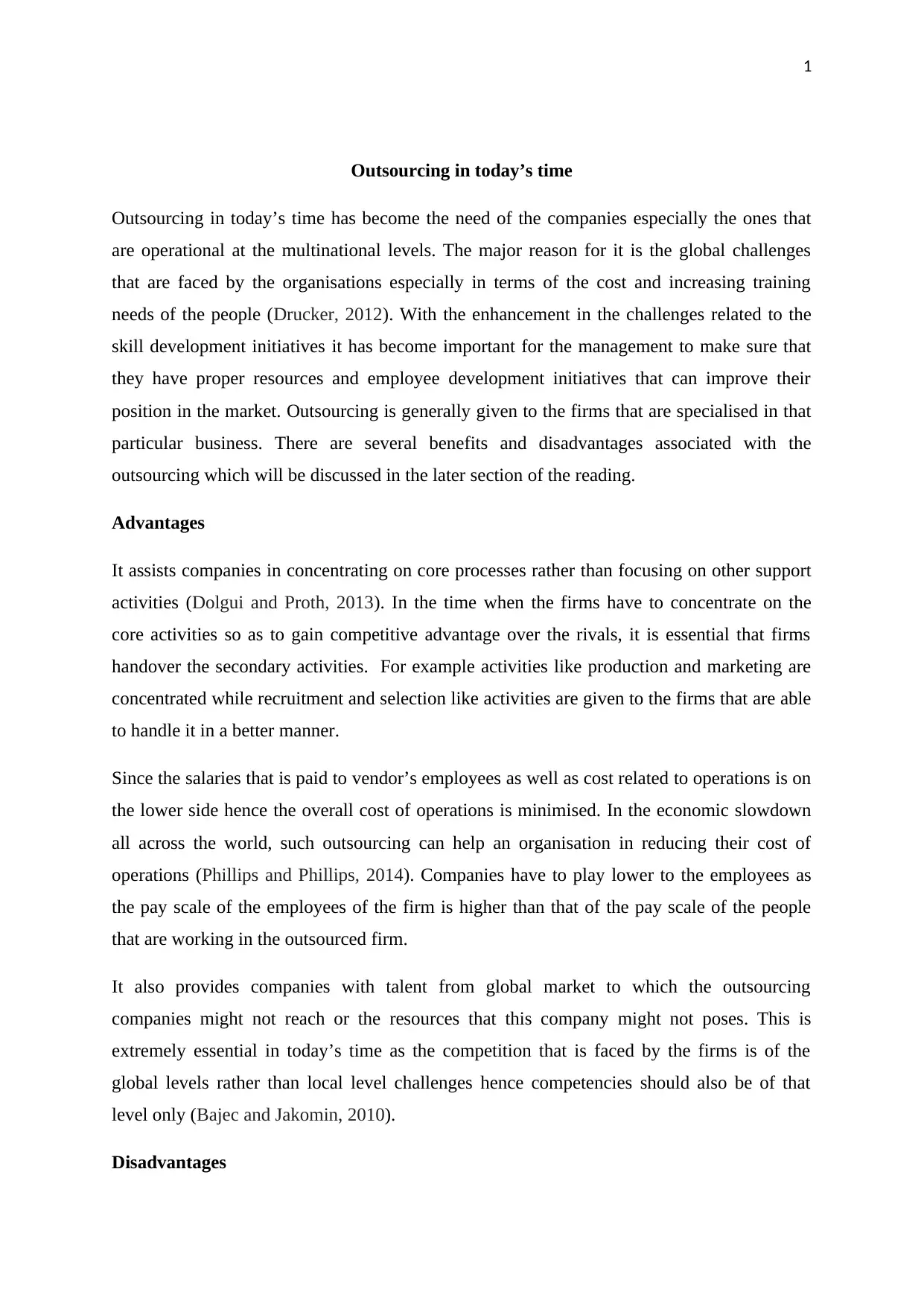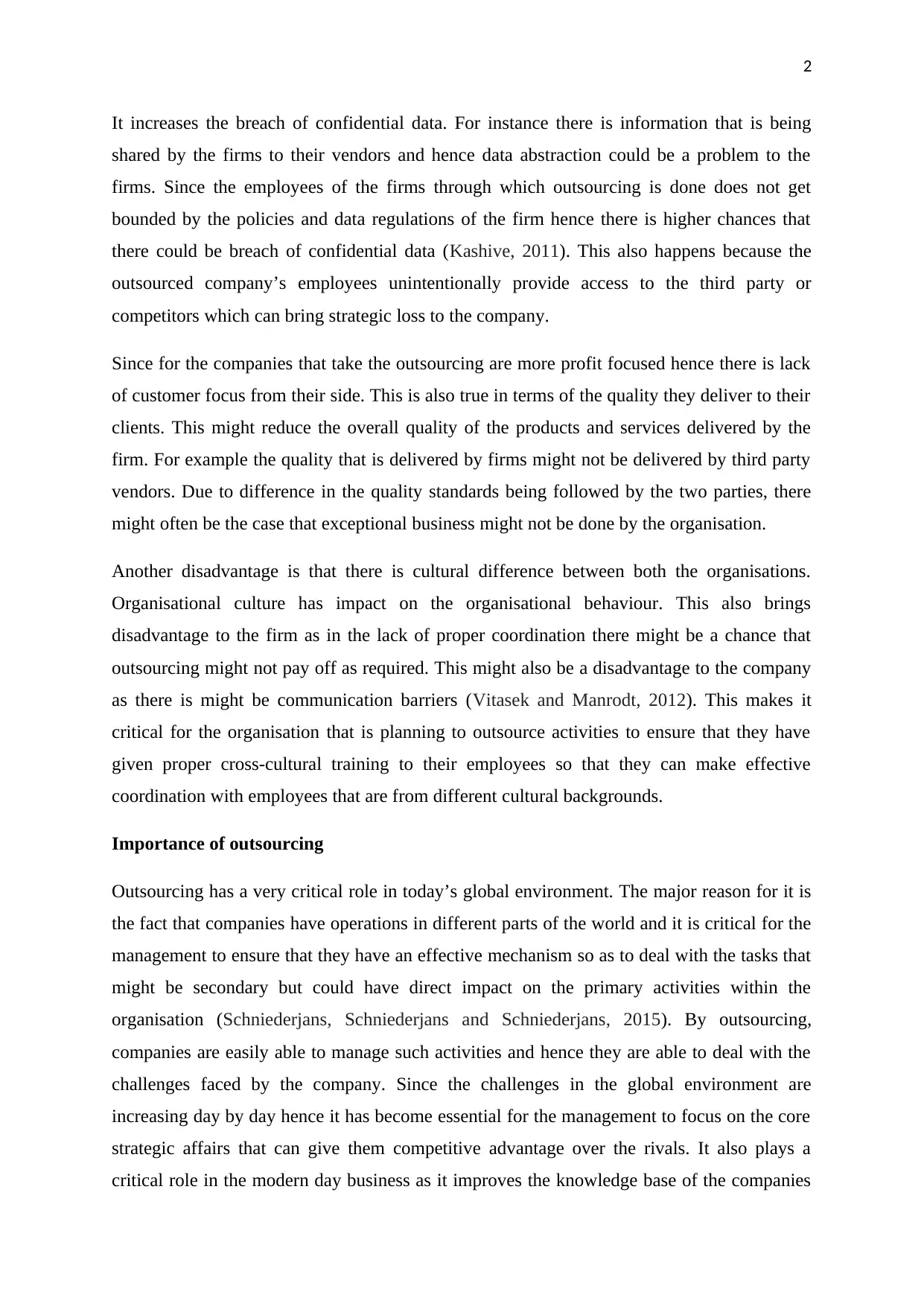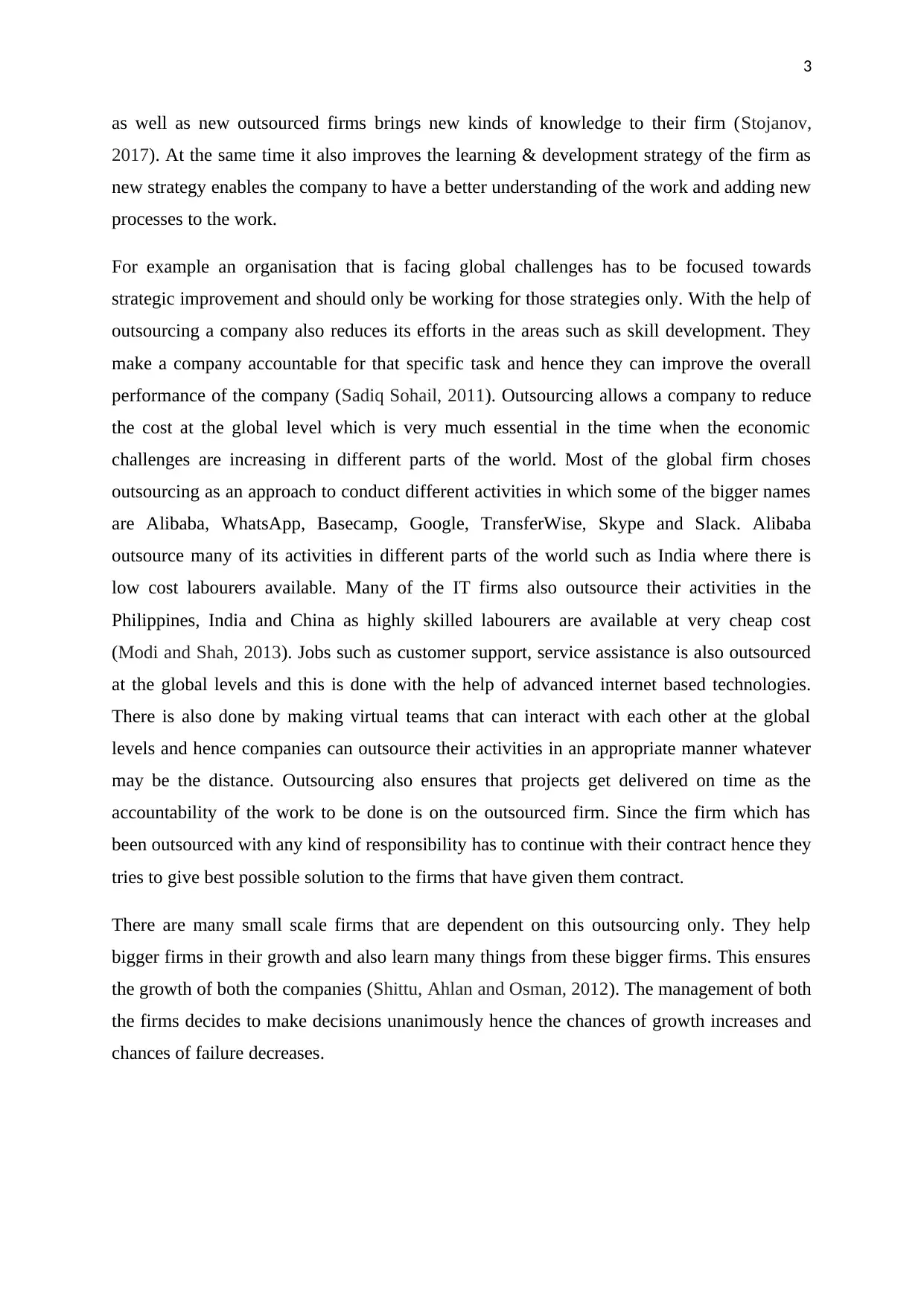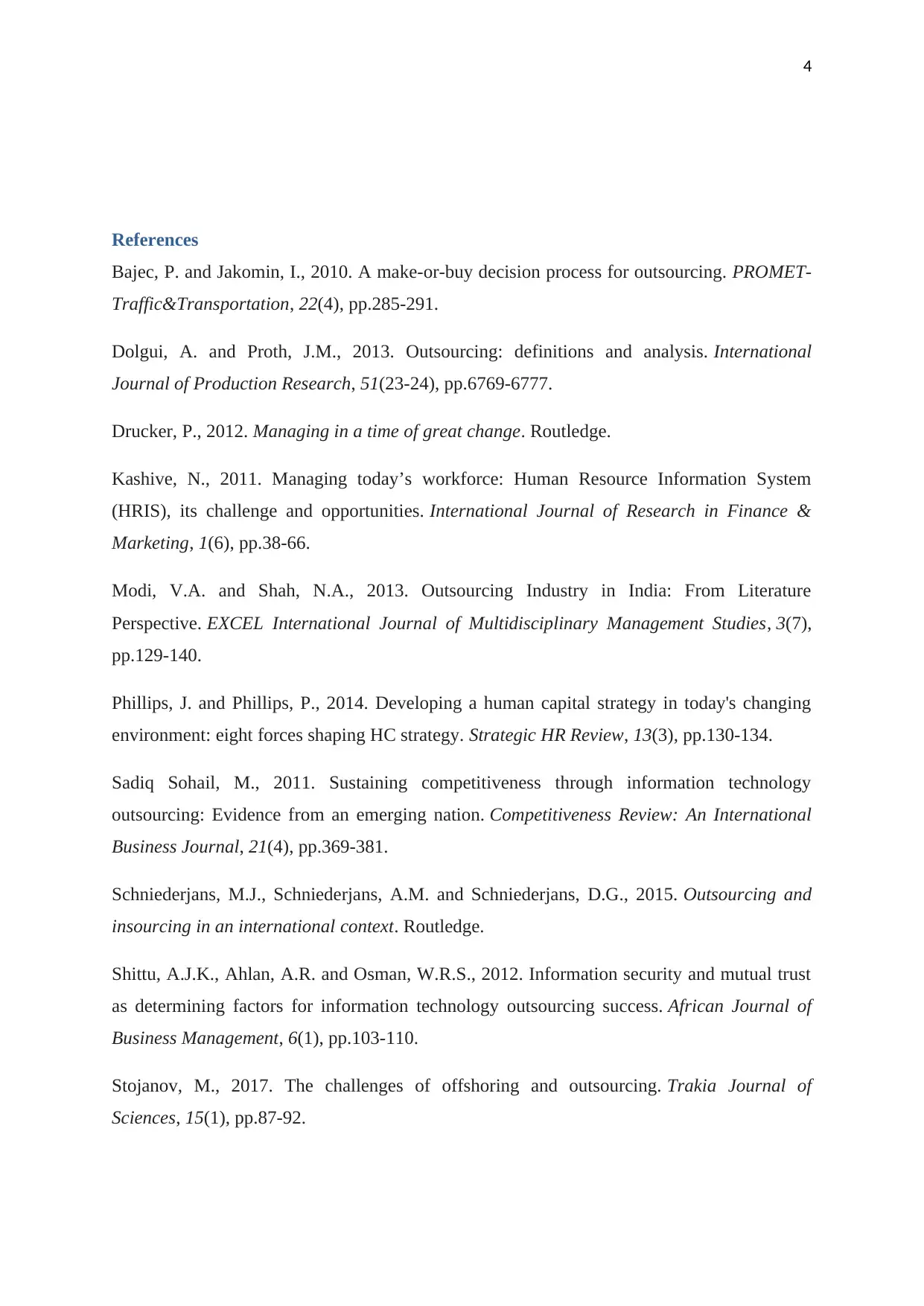HI5013 - Managing Across Borders: Outsourcing in a Global World
VerifiedAdded on 2022/10/12
|6
|1690
|57
Report
AI Summary
This report examines the multifaceted role of outsourcing in today's global business environment, particularly for multinational corporations. It delves into the advantages of outsourcing, such as cost reduction, access to specialized expertise, and the ability to focus on core competencies. The report highlights how outsourcing enables companies to navigate global challenges, manage secondary activities efficiently, and maintain a competitive edge. However, it also addresses the disadvantages, including potential data security breaches, lack of customer focus from outsourced vendors, cultural differences, and communication barriers. The report emphasizes the importance of strategic planning, cross-cultural training, and clear communication to mitigate these risks. Real-world examples, such as Alibaba and various IT firms, are used to illustrate how outsourcing is employed across different industries and geographical locations. The report concludes by underscoring the critical role of outsourcing in enhancing knowledge base, improving learning and development strategies, and reducing operational costs, making it an essential strategy for modern businesses navigating the complexities of the global market.

MANAGING ACROSS
BORDERS
BORDERS
Paraphrase This Document
Need a fresh take? Get an instant paraphrase of this document with our AI Paraphraser

1
Outsourcing in today’s time
Outsourcing in today’s time has become the need of the companies especially the ones that
are operational at the multinational levels. The major reason for it is the global challenges
that are faced by the organisations especially in terms of the cost and increasing training
needs of the people (Drucker, 2012). With the enhancement in the challenges related to the
skill development initiatives it has become important for the management to make sure that
they have proper resources and employee development initiatives that can improve their
position in the market. Outsourcing is generally given to the firms that are specialised in that
particular business. There are several benefits and disadvantages associated with the
outsourcing which will be discussed in the later section of the reading.
Advantages
It assists companies in concentrating on core processes rather than focusing on other support
activities (Dolgui and Proth, 2013). In the time when the firms have to concentrate on the
core activities so as to gain competitive advantage over the rivals, it is essential that firms
handover the secondary activities. For example activities like production and marketing are
concentrated while recruitment and selection like activities are given to the firms that are able
to handle it in a better manner.
Since the salaries that is paid to vendor’s employees as well as cost related to operations is on
the lower side hence the overall cost of operations is minimised. In the economic slowdown
all across the world, such outsourcing can help an organisation in reducing their cost of
operations (Phillips and Phillips, 2014). Companies have to play lower to the employees as
the pay scale of the employees of the firm is higher than that of the pay scale of the people
that are working in the outsourced firm.
It also provides companies with talent from global market to which the outsourcing
companies might not reach or the resources that this company might not poses. This is
extremely essential in today’s time as the competition that is faced by the firms is of the
global levels rather than local level challenges hence competencies should also be of that
level only (Bajec and Jakomin, 2010).
Disadvantages
Outsourcing in today’s time
Outsourcing in today’s time has become the need of the companies especially the ones that
are operational at the multinational levels. The major reason for it is the global challenges
that are faced by the organisations especially in terms of the cost and increasing training
needs of the people (Drucker, 2012). With the enhancement in the challenges related to the
skill development initiatives it has become important for the management to make sure that
they have proper resources and employee development initiatives that can improve their
position in the market. Outsourcing is generally given to the firms that are specialised in that
particular business. There are several benefits and disadvantages associated with the
outsourcing which will be discussed in the later section of the reading.
Advantages
It assists companies in concentrating on core processes rather than focusing on other support
activities (Dolgui and Proth, 2013). In the time when the firms have to concentrate on the
core activities so as to gain competitive advantage over the rivals, it is essential that firms
handover the secondary activities. For example activities like production and marketing are
concentrated while recruitment and selection like activities are given to the firms that are able
to handle it in a better manner.
Since the salaries that is paid to vendor’s employees as well as cost related to operations is on
the lower side hence the overall cost of operations is minimised. In the economic slowdown
all across the world, such outsourcing can help an organisation in reducing their cost of
operations (Phillips and Phillips, 2014). Companies have to play lower to the employees as
the pay scale of the employees of the firm is higher than that of the pay scale of the people
that are working in the outsourced firm.
It also provides companies with talent from global market to which the outsourcing
companies might not reach or the resources that this company might not poses. This is
extremely essential in today’s time as the competition that is faced by the firms is of the
global levels rather than local level challenges hence competencies should also be of that
level only (Bajec and Jakomin, 2010).
Disadvantages

2
It increases the breach of confidential data. For instance there is information that is being
shared by the firms to their vendors and hence data abstraction could be a problem to the
firms. Since the employees of the firms through which outsourcing is done does not get
bounded by the policies and data regulations of the firm hence there is higher chances that
there could be breach of confidential data (Kashive, 2011). This also happens because the
outsourced company’s employees unintentionally provide access to the third party or
competitors which can bring strategic loss to the company.
Since for the companies that take the outsourcing are more profit focused hence there is lack
of customer focus from their side. This is also true in terms of the quality they deliver to their
clients. This might reduce the overall quality of the products and services delivered by the
firm. For example the quality that is delivered by firms might not be delivered by third party
vendors. Due to difference in the quality standards being followed by the two parties, there
might often be the case that exceptional business might not be done by the organisation.
Another disadvantage is that there is cultural difference between both the organisations.
Organisational culture has impact on the organisational behaviour. This also brings
disadvantage to the firm as in the lack of proper coordination there might be a chance that
outsourcing might not pay off as required. This might also be a disadvantage to the company
as there is might be communication barriers (Vitasek and Manrodt, 2012). This makes it
critical for the organisation that is planning to outsource activities to ensure that they have
given proper cross-cultural training to their employees so that they can make effective
coordination with employees that are from different cultural backgrounds.
Importance of outsourcing
Outsourcing has a very critical role in today’s global environment. The major reason for it is
the fact that companies have operations in different parts of the world and it is critical for the
management to ensure that they have an effective mechanism so as to deal with the tasks that
might be secondary but could have direct impact on the primary activities within the
organisation (Schniederjans, Schniederjans and Schniederjans, 2015). By outsourcing,
companies are easily able to manage such activities and hence they are able to deal with the
challenges faced by the company. Since the challenges in the global environment are
increasing day by day hence it has become essential for the management to focus on the core
strategic affairs that can give them competitive advantage over the rivals. It also plays a
critical role in the modern day business as it improves the knowledge base of the companies
It increases the breach of confidential data. For instance there is information that is being
shared by the firms to their vendors and hence data abstraction could be a problem to the
firms. Since the employees of the firms through which outsourcing is done does not get
bounded by the policies and data regulations of the firm hence there is higher chances that
there could be breach of confidential data (Kashive, 2011). This also happens because the
outsourced company’s employees unintentionally provide access to the third party or
competitors which can bring strategic loss to the company.
Since for the companies that take the outsourcing are more profit focused hence there is lack
of customer focus from their side. This is also true in terms of the quality they deliver to their
clients. This might reduce the overall quality of the products and services delivered by the
firm. For example the quality that is delivered by firms might not be delivered by third party
vendors. Due to difference in the quality standards being followed by the two parties, there
might often be the case that exceptional business might not be done by the organisation.
Another disadvantage is that there is cultural difference between both the organisations.
Organisational culture has impact on the organisational behaviour. This also brings
disadvantage to the firm as in the lack of proper coordination there might be a chance that
outsourcing might not pay off as required. This might also be a disadvantage to the company
as there is might be communication barriers (Vitasek and Manrodt, 2012). This makes it
critical for the organisation that is planning to outsource activities to ensure that they have
given proper cross-cultural training to their employees so that they can make effective
coordination with employees that are from different cultural backgrounds.
Importance of outsourcing
Outsourcing has a very critical role in today’s global environment. The major reason for it is
the fact that companies have operations in different parts of the world and it is critical for the
management to ensure that they have an effective mechanism so as to deal with the tasks that
might be secondary but could have direct impact on the primary activities within the
organisation (Schniederjans, Schniederjans and Schniederjans, 2015). By outsourcing,
companies are easily able to manage such activities and hence they are able to deal with the
challenges faced by the company. Since the challenges in the global environment are
increasing day by day hence it has become essential for the management to focus on the core
strategic affairs that can give them competitive advantage over the rivals. It also plays a
critical role in the modern day business as it improves the knowledge base of the companies
⊘ This is a preview!⊘
Do you want full access?
Subscribe today to unlock all pages.

Trusted by 1+ million students worldwide

3
as well as new outsourced firms brings new kinds of knowledge to their firm (Stojanov,
2017). At the same time it also improves the learning & development strategy of the firm as
new strategy enables the company to have a better understanding of the work and adding new
processes to the work.
For example an organisation that is facing global challenges has to be focused towards
strategic improvement and should only be working for those strategies only. With the help of
outsourcing a company also reduces its efforts in the areas such as skill development. They
make a company accountable for that specific task and hence they can improve the overall
performance of the company (Sadiq Sohail, 2011). Outsourcing allows a company to reduce
the cost at the global level which is very much essential in the time when the economic
challenges are increasing in different parts of the world. Most of the global firm choses
outsourcing as an approach to conduct different activities in which some of the bigger names
are Alibaba, WhatsApp, Basecamp, Google, TransferWise, Skype and Slack. Alibaba
outsource many of its activities in different parts of the world such as India where there is
low cost labourers available. Many of the IT firms also outsource their activities in the
Philippines, India and China as highly skilled labourers are available at very cheap cost
(Modi and Shah, 2013). Jobs such as customer support, service assistance is also outsourced
at the global levels and this is done with the help of advanced internet based technologies.
There is also done by making virtual teams that can interact with each other at the global
levels and hence companies can outsource their activities in an appropriate manner whatever
may be the distance. Outsourcing also ensures that projects get delivered on time as the
accountability of the work to be done is on the outsourced firm. Since the firm which has
been outsourced with any kind of responsibility has to continue with their contract hence they
tries to give best possible solution to the firms that have given them contract.
There are many small scale firms that are dependent on this outsourcing only. They help
bigger firms in their growth and also learn many things from these bigger firms. This ensures
the growth of both the companies (Shittu, Ahlan and Osman, 2012). The management of both
the firms decides to make decisions unanimously hence the chances of growth increases and
chances of failure decreases.
as well as new outsourced firms brings new kinds of knowledge to their firm (Stojanov,
2017). At the same time it also improves the learning & development strategy of the firm as
new strategy enables the company to have a better understanding of the work and adding new
processes to the work.
For example an organisation that is facing global challenges has to be focused towards
strategic improvement and should only be working for those strategies only. With the help of
outsourcing a company also reduces its efforts in the areas such as skill development. They
make a company accountable for that specific task and hence they can improve the overall
performance of the company (Sadiq Sohail, 2011). Outsourcing allows a company to reduce
the cost at the global level which is very much essential in the time when the economic
challenges are increasing in different parts of the world. Most of the global firm choses
outsourcing as an approach to conduct different activities in which some of the bigger names
are Alibaba, WhatsApp, Basecamp, Google, TransferWise, Skype and Slack. Alibaba
outsource many of its activities in different parts of the world such as India where there is
low cost labourers available. Many of the IT firms also outsource their activities in the
Philippines, India and China as highly skilled labourers are available at very cheap cost
(Modi and Shah, 2013). Jobs such as customer support, service assistance is also outsourced
at the global levels and this is done with the help of advanced internet based technologies.
There is also done by making virtual teams that can interact with each other at the global
levels and hence companies can outsource their activities in an appropriate manner whatever
may be the distance. Outsourcing also ensures that projects get delivered on time as the
accountability of the work to be done is on the outsourced firm. Since the firm which has
been outsourced with any kind of responsibility has to continue with their contract hence they
tries to give best possible solution to the firms that have given them contract.
There are many small scale firms that are dependent on this outsourcing only. They help
bigger firms in their growth and also learn many things from these bigger firms. This ensures
the growth of both the companies (Shittu, Ahlan and Osman, 2012). The management of both
the firms decides to make decisions unanimously hence the chances of growth increases and
chances of failure decreases.
Paraphrase This Document
Need a fresh take? Get an instant paraphrase of this document with our AI Paraphraser

4
References
Bajec, P. and Jakomin, I., 2010. A make-or-buy decision process for outsourcing. PROMET-
Traffic&Transportation, 22(4), pp.285-291.
Dolgui, A. and Proth, J.M., 2013. Outsourcing: definitions and analysis. International
Journal of Production Research, 51(23-24), pp.6769-6777.
Drucker, P., 2012. Managing in a time of great change. Routledge.
Kashive, N., 2011. Managing today’s workforce: Human Resource Information System
(HRIS), its challenge and opportunities. International Journal of Research in Finance &
Marketing, 1(6), pp.38-66.
Modi, V.A. and Shah, N.A., 2013. Outsourcing Industry in India: From Literature
Perspective. EXCEL International Journal of Multidisciplinary Management Studies, 3(7),
pp.129-140.
Phillips, J. and Phillips, P., 2014. Developing a human capital strategy in today's changing
environment: eight forces shaping HC strategy. Strategic HR Review, 13(3), pp.130-134.
Sadiq Sohail, M., 2011. Sustaining competitiveness through information technology
outsourcing: Evidence from an emerging nation. Competitiveness Review: An International
Business Journal, 21(4), pp.369-381.
Schniederjans, M.J., Schniederjans, A.M. and Schniederjans, D.G., 2015. Outsourcing and
insourcing in an international context. Routledge.
Shittu, A.J.K., Ahlan, A.R. and Osman, W.R.S., 2012. Information security and mutual trust
as determining factors for information technology outsourcing success. African Journal of
Business Management, 6(1), pp.103-110.
Stojanov, M., 2017. The challenges of offshoring and outsourcing. Trakia Journal of
Sciences, 15(1), pp.87-92.
References
Bajec, P. and Jakomin, I., 2010. A make-or-buy decision process for outsourcing. PROMET-
Traffic&Transportation, 22(4), pp.285-291.
Dolgui, A. and Proth, J.M., 2013. Outsourcing: definitions and analysis. International
Journal of Production Research, 51(23-24), pp.6769-6777.
Drucker, P., 2012. Managing in a time of great change. Routledge.
Kashive, N., 2011. Managing today’s workforce: Human Resource Information System
(HRIS), its challenge and opportunities. International Journal of Research in Finance &
Marketing, 1(6), pp.38-66.
Modi, V.A. and Shah, N.A., 2013. Outsourcing Industry in India: From Literature
Perspective. EXCEL International Journal of Multidisciplinary Management Studies, 3(7),
pp.129-140.
Phillips, J. and Phillips, P., 2014. Developing a human capital strategy in today's changing
environment: eight forces shaping HC strategy. Strategic HR Review, 13(3), pp.130-134.
Sadiq Sohail, M., 2011. Sustaining competitiveness through information technology
outsourcing: Evidence from an emerging nation. Competitiveness Review: An International
Business Journal, 21(4), pp.369-381.
Schniederjans, M.J., Schniederjans, A.M. and Schniederjans, D.G., 2015. Outsourcing and
insourcing in an international context. Routledge.
Shittu, A.J.K., Ahlan, A.R. and Osman, W.R.S., 2012. Information security and mutual trust
as determining factors for information technology outsourcing success. African Journal of
Business Management, 6(1), pp.103-110.
Stojanov, M., 2017. The challenges of offshoring and outsourcing. Trakia Journal of
Sciences, 15(1), pp.87-92.

5
Vitasek, K. and Manrodt, K., 2012. Vested outsourcing: a flexible framework for
collaborative outsourcing. Strategic Outsourcing: An International Journal, 5(1), pp.4-14.
Vitasek, K. and Manrodt, K., 2012. Vested outsourcing: a flexible framework for
collaborative outsourcing. Strategic Outsourcing: An International Journal, 5(1), pp.4-14.
⊘ This is a preview!⊘
Do you want full access?
Subscribe today to unlock all pages.

Trusted by 1+ million students worldwide
1 out of 6
Related Documents
Your All-in-One AI-Powered Toolkit for Academic Success.
+13062052269
info@desklib.com
Available 24*7 on WhatsApp / Email
![[object Object]](/_next/static/media/star-bottom.7253800d.svg)
Unlock your academic potential
Copyright © 2020–2026 A2Z Services. All Rights Reserved. Developed and managed by ZUCOL.





